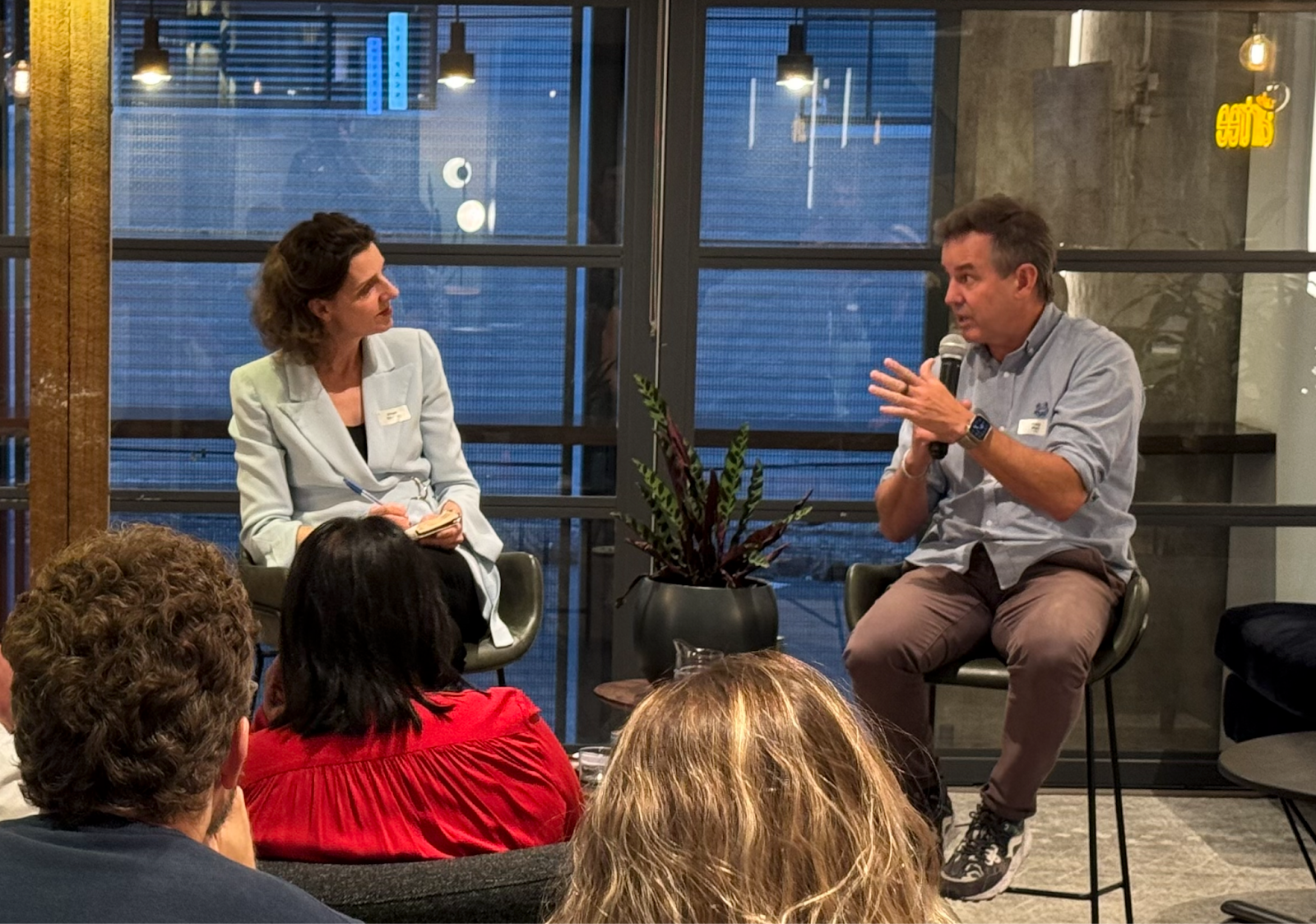
For many founders, government can be complex, intimidating and distant. Yet learning how to engage can open access to funding, customers and support.
Grants in Australia and in New Zealand may be a strategic source of capital, but this is often where the conversation on this topic incorrectly ceases. Australia's total government spending as a proportion of GDP is estimated to reach 28% by the end of 2025, and New Zealand around 20%. This massive spending pool represents a significant, often-untapped market for innovative companies.
At Airtree, we regularly engage with government on policy issues that impact the ecosystem (such as tax incentives and skilled migration) and there are times where startups can benefit from more direct engagement.
This guide sets out how you can begin thinking about and building a policy or government relations strategy, and some practical steps you can take to get started.

Why should you engage with government?
Nicholas Chilton served as Head of Government Affairs at Vow, and now runs Venture Affairs, an Australia-based lobbying and government relations firm dedicated to startups and scaleups. He frames the relationship between startups and government in three ways: customer, gatekeeper, and supporter.
The Customer
Governments can be a major customer of software and hardware through both traditional procurement and offtake agreements (purchases made in advance of the product being delivered). They can also set up entire industries and signal to the market that a new industry is viable, encouraging private companies to buy too.
Beyond products, governments look for companies that deliver jobs and economic activity in priority areas such as regional development, education, or the energy transition. Even if you are not pitching a contract, you may still be solving a problem they care about.
The Gatekeeper
In highly regulated industries like energy, agriculture, or manufacturing, the government can pose an existential threat. But regulatory frameworks go both ways. While they may prevent you from selling your product, they can also be an enabler of new startups.
Whether you’re in a heavily regulated sector or plan to sell to government, you should start thinking about these dynamics early. Nicholas advises startups to align their product with the government’s priorities and narrative.
“Have an early-stage conversation to understand what problems the government is trying to solve. It’s a much better approach than building a product and then asking ‘does this fit?’"
The Champion
Governments can act as supporters by offering funding and connections. Many federal and state programs exist, which can help local companies expand offshore.
Nicholas notes, “You’d be surprised at how many meetings you can get with senior staff if you frame it well and approach it professionally. Government isn’t the scary monster many people think it is.”
State investment agencies such as Investment NSW or Trade and Investment Queensland have dedicated teams to help companies access global markets. If you are attending an international conference, ask them for support. They can arrange meetings, put you on panels and make introductions, at no cost.
How to engage: Thinking beyond lobbying
Engaging with government is a relationship game. It takes consistent effort to build, but when they come through for you, it’s worth it. Think of it as part investment, part insurance.
You don’t need a lobbyist or an in-house expert to begin. Start by building connections with your local, state and federal members (even Ministers) through emails or letters. They are your best advocates and resources to get things done, even if they’re a new member without a portfolio.

Tell them what you’re doing and why it’s innovative and worthy of their attention. Invite them to visit your company or facility. This can be a great way of opening the door.
Soroush Pour, founder of Harmony Intelligence, has briefed the Australian government on AI adoption, and remains engaged with the public sector. His advice: be persistent and patient.
“Government is a giant game of stakeholder management. Things can't happen overnight. If you want something to change, you need to be willing to explain it in clear and productive ways again and again until a critical mass of the relevant people agree with you and mobilise to make it happen,” he says.
“People in government are just…people. While they have unique incentives and constraints, if you appeal to their desire to build a better department, city, country or world, and give them concrete recommendations to act on that, they can help make it happen.”
Case study: How Zepto built influence
Payment infrastructure startup Zepto proactively identified three priority policy areas critical to its growth and the wider ecosystem: payments system reform, Consumer Data Right (CDR) and digital asset regulation. These were areas where Zepto had deep expertise and could offer a credible point of view. This came in the form of policy submissions, which eventually led to invitations to speak at formal hearings with the Reserve Bank of Australia (RBA).
Zepto also made a point of “showing up”, attending events, meeting stakeholders and ensuring officials knew who they were. Crucially, they avoided narrow lobbying and focused on system-wide benefits. This approach helped shape RBA reforms to financial infrastructure.
“Don’t just push your own agenda,” says Emily Curlewis, Zepto’s Head of Government Engagement. “Advocate for reforms that will increase competition and innovation across the whole ecosystem. Trust is built when you position yourself as a constructive partner rather than a special-interest lobbyist,” she added.

How to engage outside help
For most startups, hiring a traditional lobbying firm is unnecessary. These firms are expensive and usually geared toward large-scale campaigns or short sprints pointed at urgent crises.
Similarly, hiring in-house can be expensive if you want someone with experience and networks. You will also need to be prepared to shape a multi-faceted role around communications and strategy, because government relations can vary dramatically in workload from week to week. For most startups, a low-tempo, consistent engagement usually makes more sense.
Joining collective groups can be more effective. Industry bodies like FinTech Australia, the Tech Council of Australia (TCA), DIGI or NZ’s Tech Alliance give startups a stronger voice and provide guidance on policy issues. Due to cost and commitment required, membership may not always suit early-stage companies, but investors and partners (such as Airtree) can often connect you in.
A collective message has much greater resonance than one from a single company alone. Even a small group of startups voicing the same issue will get more traction with government.
Selling to the government as a startup
If you’re thinking about selling to the government, make sure your ducks are in a row. Investor and advisor Serge Van Dam encourages founders to pare down to the basics. “You’ll need to demonstrate that your solution is cheapest, and that it is the best value for taxpayers. The so-called safe option often fails on both counts,” he notes. Before you begin your sales motion, make sure your security and compliance are enterprise-ready.
Government procurement is all about risk-minimisation and mitigation; you need to offer departmental officials a low-risk, high-value opportunity that ensures they can present a defensible business case to their superiors.
Learn how procurement rules work in your state. Many have thresholds where contracts under a certain value can be awarded directly, without a full tender.
Nicholas suggests another great strategy can be exploring partnerships with existing ‘primes’ — larger, pre-approved firms that already contract to the government. “A partnership like this can significantly reduce concerns about technical support capabilities and credibility, especially for a startup, but may come with a transactional sacrifice to make it work,” he says.

Actionable guide for founders
A step-by-step playbook to help you begin:
- Understand where government impacts your business: Think clearly about what relationship you need with the government and what you want from them. Is it funding, regulatory change, regulatory stability, export assistance, etc.? Shape your interactions around these needs.
- Get to know your local members: Reach out to your local state and federal members and invite them to tour your space, and meet your team. Even without a physical product, you are a story of local innovation they can support.
- Proactively watch for opportunities: While industry bodies will ideally broadcast what’s coming, you’ll also benefit from telling them what you’re interested in. If you can leverage relationships with larger companies to keep across things, you should.
- Tailor your pitch: When talking to government, frame your company's story around public benefit and social impact, not just commercial returns. Think about what you give back to government, whether it’s a big problem you solve or just a new market you’re creating. Quantify this impact where possible, such as export potential or jobs created.
- Know your audience: Don't assume the government is a homogeneous entity. Research individual ministers and their staff to understand their priorities and roles. Backgrounds matter, and they can be the “way in” to a productive relationship.
- Be clear on your ask: When you do engage with government representatives, always have a specific, tangible ask ready. Even if it’s just an invitation to visit a facility or meet the team, know what you’re hoping to achieve.
- Create a "grant room": Maintain a dedicated grants room separate from your investor data room. This repository of necessary documents will save you significant time when applying for grant programs.
- Leverage regional opportunities: If your business is in a physical industry, explore how you can create regional jobs. State and local governments will often offer significant incentives to attract businesses to their regional areas and electorates.
- Maintain ongoing regulatory engagement: Proactively build relationships with regulators and government officials before issues arise. This allows you to more easily lean on the government for help when facing blockers.
Engaging with government can feel like a distraction from building. In reality, it opens doors to funding, customers and influence that can make growth faster and smoother.
Start simple, keep it consistent, and treat it like any other relationship you invest in. Done well, government engagement can be a durable advantage for your startup.


